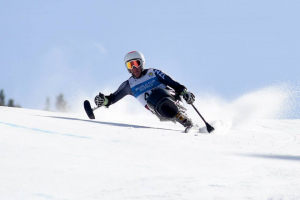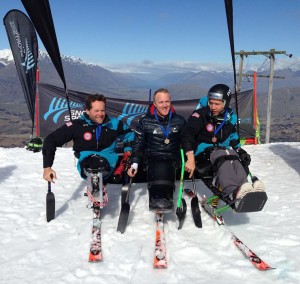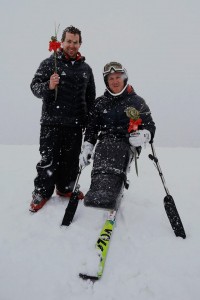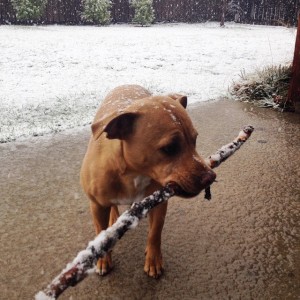“It’s not whether you get knocked down, it’s whether you get back up” – Corey Peters 2015.
Achieving World status after three years of dedicated training has been an incredible journey for Corey Peters.
after three years of dedicated training has been an incredible journey for Corey Peters.
“I certainly wasn’t thinking that when I first started skiing that I would be the best in the world. I couldn’t really believe I had won the World Championships.”
In September 2009 Corey was paralysed from the waist down after a jump landed terribly wrong at a motor-cross event in Taupo.
After only a couple of laps to warm up, it was time to race on an unfamiliar track. A very miscalculated decision of holding the throttle open as he hit the jump meant that he “absolutely, completely, overshot” the landing. “I was so high in the air it wasn’t funny.”
Split seconds in the air turned into what seemed like forever. “Time kind of slowed down when I was at the peak of the jump in the air.” The bike making contact with the ground, therefore landing the jump, was actually the worst thing that could have happened.
“As soon as I hit the ground, still on the bike because I landed the jump, the suspension bottomed out and my butt smacked the seat. With the suspension bottoming out it was like landing in a seated position on concrete as there was no travel left in the suspension. That was when my vertebrae completely burst on impact. In the air I just lost all feeling in my legs and ended up crashing into a wall made of hay bales.”
The seriousness of the accident became apparent as Corey attempted to sit up and realised he couldn’t. “That was when I started freaking out and panicked quite a lot.” He managed to pull off his helmet and goggles before medics reached him.
“To this day from my knees down it is like pins and needles or even a burning sensation in my feet. That is the sensation I have every day. It is sort of like maybe a burning, bubbling sensation I guess.”
Corey spent four long months in the Burwood Spinal Unit. As the swelling began to subside some of the nerves began to re-fire and so he attended rehab and physio therapy five days a week to see what movement he could regain.
The next two years of his life blurred past in various levels of depression. He felt that his life as an avid sportsman was over and his career as a builder/cabinetmaker was no longer possible. He had recently purchased a house in New Plymouth and was in the process of renovating it. He now had to watch helplessly as others completed the work.
“I had lived a pretty active lifestyle and all my mates were still surfing while I was sitting at home feeling sorry for myself. You don’t know what to do with yourself as sports was such a huge part of my life. I hated sitting still. I always had to be doing something. After the accident I had to then rely on other people to do something that I knew how to do but couldn’t physically do it.”
As much as the injury is physical it is mental as well. Corey has struggled with adjusting to people staring, even now five years down the track there are people within society that treat you differently. “I’m still the same person and it’s nice when people treat you as an equal and see through the disability. That was a big thing for me to have to accept. Looking young and fit people are curious I guess as to why I am pushing my chair down the street.”

Sport is very important to Corey and any excuse to join in is welcomed. On a recent visit home to the Naki he participated in a wheelchair basketball tournament. He believes it is essential to have physical activity to stimulate you as too much sitting around doing nothing can lead negative thoughts. It’s important to get those ‘feel good’ endorphins going in the body.
“The first two years you have all these people around you helping and trying to make you better throughout the rehab phase such as friends, family, doctors, occupational therapists, physios. Then after awhile that all begins to dwindle down. That is when you sort of feel like everybody else is carrying on with their life to some degree and you get left behind a little bit.
“That’s where I got to after two years and I thought right I can’t keep doing this. I’m feeling down and depressed and feel like shit. I don’t want to live like this for the rest of my life. I need to change something.”
A friend in Taranaki introduced him to the sport of sit skiing and he was hooked after the first try. He felt that it was a good fit and decided to give it 110% to see what he could achieve. The sit ski enabled him to join back in with his mates as he didn’t feel restricted or handicapped. “It is a sport where I am fully independent and the disability basically disappears.”
Enjoying the speed and having natural balance from years of surfing and motorcross catapulted Corey towards success. “I think to a certain degree it’s in your DNA you either have it or you don’t. But in saying that natural talent will only get you so far and then that’s when the hard work and determination comes in.”
Many, many hours of training later and his list of awards are impressive for someone so new to the sport. “It is absolutely awesome to not only be able to do something you love but get paid for it as ell is the dream. I never thought I would be a professional sportsperson. I enjoyed playing sport and consider myself naturally talented at most sports I’ve tried but I didn’t think I would become the best in the world at a particular sport like I did this year.

“I get paid to ski now and get a huge amount of support from different sporting organisations to achieve my goals within the sport. That has really only come about over the past couple of years as my results have got better. That is the nature of high performance sport, the better the results the better the support network around you becomes. Unless you are an All Black it is hard to make a proper living out of it though.”
Always one to look ahead Corey is working towards life after sport as he works towards a Batchelor of Arts majoring in Psychology. Allocating study time around all the training and travelling means part-time but he has a really good support network from High Performance Sport New Zealand helping him achieve his goals.
“It is important to think ahead. I always said from the beginning that I didn’t want to be on ACC for the rest of my life and be a beneficiary. I want to contribute to society and that in turn gives you something to wake up for in the morning.
“I just thought I have already been to the top level within my sport and it would be really good to learn some of the theory behind sports psychology and how athletes can perform better. Another avenue is to maybe work with people that have sustained a life changing injury helping them to overcome adversity and live fulfilling lives.”
Another goal the avid surfer has set himself is to get back into the surf. After four years of back to back winters he hopes to make time soon. “I haven’t been swimming in the ocean since the accident. I am definitely keen to figure out a way to surf again.”
“There are a few people I’ve met in wheelchairs who say ‘I wouldn’t change anything, I have had a really good life since being in the chair’ that being said although the last three or four years with the skiing and travelling the world competing has been awesome the ultimate goal would be to walk and be able to have sensation again. Being a surfer to be able to walk across the beach and feel the sand between your toes would be great.”
Corey has worked hard at rehab and his muscles are working down to his knees allowing him to get around on crutches for short distances. He can also stand to do things such as cooking and the dishes as well as reach into the cupboards. “It is still really tough and often frustrating that I can’t walk but I can do a lot more than what many other people in chairs can so it’s important to remember that and appreciate it.”
 The 32-year-old is also looking forward to the day when he has someone to share his life with and have a family. For now his dog Cruz has that role as they have been together since his accident. “He is always there. Dogs are such loyal animals and love so unconditionally. He’s certainly been a huge part of my recovery and rehabilitation.”
The 32-year-old is also looking forward to the day when he has someone to share his life with and have a family. For now his dog Cruz has that role as they have been together since his accident. “He is always there. Dogs are such loyal animals and love so unconditionally. He’s certainly been a huge part of my recovery and rehabilitation.”
Corey is now focused on working hard towards the 2018 Winter Paralympic Games in Pyeong Chang, Korea and strongly believes ‘it’s not whether you get knocked down, it’s whether you get back up.’
